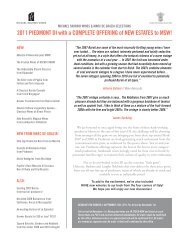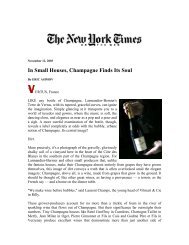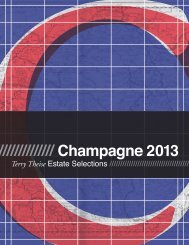German Catalog 2006 USE THIS ONE.qxp - Michael Skurnik Wines
German Catalog 2006 USE THIS ONE.qxp - Michael Skurnik Wines
German Catalog 2006 USE THIS ONE.qxp - Michael Skurnik Wines
You also want an ePaper? Increase the reach of your titles
YUMPU automatically turns print PDFs into web optimized ePapers that Google loves.
ized, is entitled at least to know it.<br />
Pigott went on to claim that any wine anyone<br />
likes is ipso-facto “good” wine, and this is just the<br />
slippery slope we can’t help sliding down when we<br />
try to be “democratic”. It is manifestly impossible to<br />
support a definition of “good” as “wine that someone,<br />
regardless of who they are, finds to taste good.” This<br />
is irresponsible, it ducks the question. Once at a presentation<br />
I was terribly busy and opened bottles without<br />
a chance to screen them. A punter remarked that<br />
a particular wine was “fantastic; I never had anything<br />
that tasted like this, wow, how was this made . . . ?”<br />
and his enthusiasm infected me and I poured myself<br />
a taste. CORKED! What should I have done, based on<br />
Pigott’s definition of “good”? The gentleman liked a<br />
patently flawed wine. He has every “right” to like it;<br />
no one disputes this. But I felt honor-bound to (discreetly<br />
and tactfully!) correct him.<br />
Thus I can’t endorse a definition of “good” that<br />
is as “inclusive and democratic” as some desire. I do<br />
not believe nature has any use for our democracies;<br />
she is in essence heirarchal. Some things are better<br />
than others, and one of our functions is gently to<br />
guide our readers toward appreciation of these distinctions.<br />
If we take these democratic principles and apply<br />
them to any other thing about which aesthetic or cultural<br />
criticism is warranted, do they stand up? Shall<br />
we endorse a statement such as “All art is good art as<br />
long as someone likes it”? Does this sentiment apply<br />
equally to architecture, poetry, cuisine? Or is wine<br />
somehow “special” because too few people drink it?<br />
And should we pander to every sort of unformed or<br />
misguided taste because we’re trying to get more<br />
people to drink wine?<br />
Let me be clear: no one has to like wine the way<br />
I like it, or the way any “expert” likes it. If wine is a<br />
casual beverage for you, then the discussion ends.<br />
Wine is complicated and therefore intimidating to<br />
people, but I’ll make you a deal: you promise not to<br />
lash out at me for what I know because you feel<br />
intimidated, and I’ll promise not to guilt-trip you<br />
into acquiring “expertise” over a subject you don’t<br />
care that much about. Deal?<br />
The truest reason to write humanely is because<br />
it is good to be humane. Any professional who uses<br />
words does well to shade them so as not to deliver<br />
gratuitous insults to people with dubious or uneducated<br />
taste. But that doesn’t mean he abrogates his<br />
entire judgmental faculties — which by the way are<br />
why we hired him — in search of some romance about<br />
inclusion or democracy.<br />
There are no “invalid” moments of pleasure in<br />
wine. But, there are higher and lower pleasures.<br />
Once you have graduated from the low you can<br />
always return. It’s fun to return! If you’re somewhere<br />
in the process of honing your wine taste and<br />
you want to continue, no one helps you if he fails to<br />
delineate the distinctions between inadequate, ordinary,<br />
good, fine and great — or between “industrial’<br />
and “agricultural” wines. Maybe there is a thin line<br />
between this and Pigott’s “attach[ing] an imperative”<br />
but the way through involves nurturing one’s<br />
own kindness and honing one’s craft with words.<br />
I feel it is indeed unkind to flatten all taste to a<br />
specious equality, made even more pernicious by<br />
encouraging the philistines to set the level.<br />
Me, I have a powerful aversion to wines that<br />
gush and scream, they annoy me, and I tell you why,<br />
and you make up your own mind. MY imperative<br />
isn’t everyone’s, self-evidently: but I strive to send<br />
clear signals, to advocate what I think is worthy and<br />
to identify and explain what I think is unworthy, and<br />
if my tone is “superior, even dictatorial” then the<br />
fault lies with ME. I have failed to communicate my<br />
point. But, the POINT remains.<br />
89
















